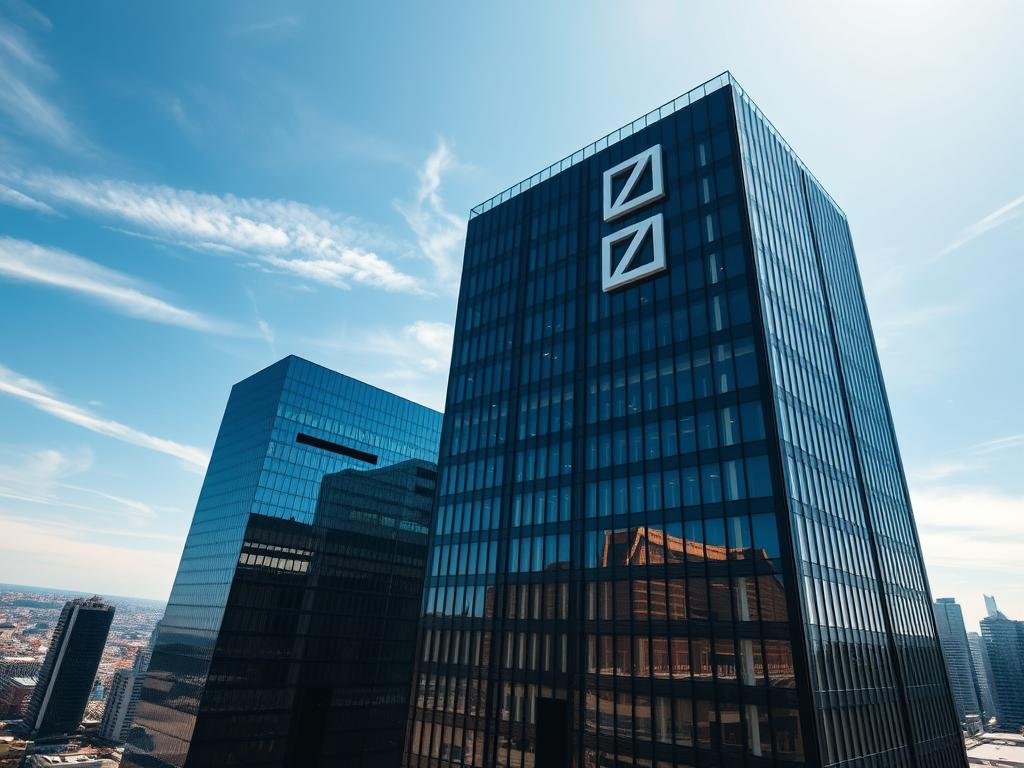Your path to tailored renovation and construction finance starts here. This short guide shows you how Deutsche Bank designs lending and community support for projects across the United States. You will learn key features like up to 75% loan-to-value, loans up to Rs. 25 crores, balance transfer options, and flexible tenors from 5 to 20 years.
Whether you are an individual planning home upgrades or a business preparing larger work, you will see how fixed or floating rates, optional repayment insurance, and competitive underwriting affect your monthly cost and total money required.
We also cover the Deutsche Bank Americas Foundation and the Community Development Finance Group. These groups channel grants, loans, and investments into affordable housing and community projects through competitive RFPs. You will get a clear next-step map to match your needs with the right channel and avoid delays.
Key Takeaways
- Understand core lending features: LTV limits, tenors, and interest options.
- Know which Deutsche Bank channels serve individuals, business, and nonprofits.
- See how RFP-driven grants and investments work in the U.S. market.
- Learn practical steps to organize documents and seek advisor support.
- Compare renovation vs. ground-up construction to gauge risk and requirements.
What construction-renovation-funding-deutsche-bank means for you right now
To act now, you need a clear view of whether loans, grants, or hybrid capital best suit your project timeline and goals.
Defining loans, grants, and hybrid finance
Think of this financing as a spectrum. Loans give you predictable repayment and defined schedules. Grants and program-related investments reduce borrower risk when community outcomes matter.
When to pick renovation versus ground-up construction
Choose renovation if you improve an existing structure with clear scopes like kitchens or system upgrades. Renovation usually takes less time and lowers exposure to cost escalation.
Pick construction when you need site work, permits, and longer schedules. Ground-up projects often require larger loan sizes and multi-year planning.
U.S. landscape: Deutsche Bank Select and community programs
In the U.S., the Deutsche Bank Americas Foundation and the Community Development Finance Group deploy loans, grants, and investments through targeted RFPs.
- DB Working Capital supports early predevelopment work.
- DB SHARE targets acquisitions and rehab for supportive housing in New York City.
- Follow the RFP order: check eligibility, assess readiness, then build a loan+grant capital stack.
Eligibility and use cases: matching your needs with Deutsche Bank pathways
Match your project’s scale and timeline to the right Deutsche Bank channel before you apply. Start with a clear list of scopes—additions, energy upgrades, system replacements—and a number-backed budget and timeline in years. That prepares you for either consumer loans or program-led support.
Individuals and businesses: renovations, additions, and property upgrades
If you are an individual or business pursuing renovations or small construction, assess credit readiness, income stability, and collateral strength. Lenders will want contractor bids, permits, and a clear budget.
- Checklist: ID, address, income docs, contractor quotes.
- Show growth: forecast higher rents or lower costs to cover debt service.
- Prepare cases: prior project references strengthen applications.
Nonprofits and community developers: affordable and supportive housing projects
For nonprofits in New York City, Deutsche Bank Americas Foundation runs competitive RFPs roughly every three years. Explore DB Working Capital for predevelopment and DB SHARE for supportive housing acquisition and rehab.
Align your organizational capacity, governance, and impact metrics to improve chances of receiving funds.
Key features to evaluate before you apply
Start by testing fixed and floating scenarios so you can see how market moves affect your project’s budget. Model payments under each case and include fees and repricing events in your math.
Rates and interest structures
Fixed rates give certainty; floating rates may start lower but can rise with benchmarks. Run total-cost projections using example spreads (fixed from 6.60% or floating near 8.69% mean) and include repricing or switch fees.
Loan-to-value, amounts, and terms
Use the 75% LTV cap and maximum amounts (up to Rs. 25 crores where applicable) as guardrails. Align your scope and timeline to tenors of 5–20 years to estimate EMIs and reserve contingencies.
Insurance and risk management
Protect repayments with optional EMI insurance and contingency budgets. Milestone-linked payments to contractors reduce exposure to cost overruns and events that stall work.
Balance transfers
“Compare transfer savings after you factor in switch fees, prepayment charges, and the order of charges the bank applies.”
- Stress-test EMIs for rate rises and delays.
- Assemble documents early to confirm amounts.
- Benchmark fees and negotiate within policy limits.
How to access funding through Deutsche Bank Select
Start your Deutsche Bank Select application by mapping each document and deadline to a clear timeline. That simple step reduces back-and-forth and keeps your request in the right order for underwriting.

Your application roadmap: documentation, credit readiness, and advisor support
Build a short list of essentials: ID, address proof, income slips, tax returns, property papers, and contractor bids.
Verify credit readiness and the number that matters — project budget, contingency, and monthly payment capacity. Quantify these before you speak to an advisor.
Schedule time with a Deutsche Bank advisor to align your plans with product policy and confirm availability for individuals or business borrowers.
For community projects: RFPs, eligibility, and three-year cycles
The Foundation issues targeted RFPs on roughly three-year cycles. You must apply through those channels; unsolicited proposals are not accepted.
- Match eligibility and outcome metrics to the RFP.
- Use DB Working Capital for predevelopment and DB SHARE for acquisition/rehab where eligible.
- Build milestone-based disbursement plans so funds release with verified progress.
“Position proposals with clear outcomes — affordable units delivered and supportive services provided.”
Allow time for board approvals, community engagement, and public funding coordination. These steps protect your money and improve odds for long‑term finance and investments.
Conclusion
Select the financing route that balances certainty, cost, and community impact for your project.
You are now equipped to choose a Deutsche Bank pathway for renovation or community construction, based on scope, timeline in years, and mission. Model realistic rate scenarios, disbursement schedules, and contingency amounts before you commit.
Remember that U.S. community access comes through RFP events run by the Deutsche Bank Americas Foundation; plan ahead and present clear outcomes. Formalize risk plans for unforeseen events and keep documentation tight to improve your case.
Move forward by aligning stakeholders, revisiting rate and fee assumptions as markets change, and contacting an advisor to confirm amounts and the best way ahead.
FAQ
What does "construction and renovation funding through Deutsche Bank Select" mean for you?
It refers to tailored finance options offered by Deutsche Bank for property improvement and building work. You can access loans, staged disbursements, and advisory services designed to match project size, timeline, and cash flow needs. These solutions cover individual home upgrades, commercial refits, and larger development projects that require professional underwriting and construction oversight.
How do loans, grants, and hybrid funds differ for renovation and construction?
Loans are debt products you repay with interest; grants are non-repayable and often target community or affordable housing; hybrids combine subsidized capital with market-rate lending or equity. You should review eligibility, repayment terms, and reporting requirements to determine which option reduces your overall cost and aligns with project goals.
When should you choose renovation funding instead of ground-up construction finance?
Choose renovation funding for scope-limited upgrades, energy retrofits, or code compliance where the existing structure remains. Opt for ground-up financing when you need full demolition, new foundations, or major layout changes that change the building’s footprint. Your decision should reflect cost per square foot, timeline, and permitting complexity.
How do Deutsche Bank Select offerings compare with community development initiatives in the U.S.?
Deutsche Bank Select usually offers market-oriented products with specialized underwriting and larger ticket sizes, while community initiatives provide targeted subsidies, tax credits, or low-interest capital for affordable housing. You can combine both by layering bank loans with public or philanthropic funds to improve feasibility and cash flow.
Who is eligible for these financing pathways — individuals or businesses?
Both are eligible. Individuals can access home improvement loans, personal construction mortgages, or renovation lines tied to property value. Businesses and developers can apply for project loans, construction-to-permanent facilities, and tailored capital for property upgrades or expansions, subject to credit assessment and project appraisal.
Can nonprofits and community developers apply for Deutsche Bank Select funding?
Yes. Nonprofits and community developers can secure financing for affordable housing, supportive housing, and community revitalization. Programs may require additional documentation, social impact metrics, and coordination with public funders or housing agencies to access favorable terms or blended finance solutions.
What interest rate structures should you evaluate before applying?
Compare fixed vs. floating rates, rate caps, and linkage to benchmarks like SOFR. Fixed rates give predictability; floating rates can start lower but add volatility. Consider how interest accrual affects total project cost, contingency reserves, and your repayment capacity during construction and after stabilization.
How do loan-to-value, loan amounts, and terms affect your project plan?
Loan-to-value (LTV) limits your borrowable amount against appraised value and determine equity requirements. Loan size and term influence monthly payments and debt service coverage. Match LTV and term to project timelines so draw schedules, interest reserves, and repayment start dates align with construction milestones and cash flow.
What insurance and risk management should you have in place?
Maintain builder’s risk, general liability, and title insurance, plus owner’s policies where required. Lenders often require performance bonds and contingency reserves. Proper coverage protects repayments, secures lender approvals, and limits exposure to delays, cost overruns, or contractor defaults.
Can you transfer existing high-rate obligations to optimize cash flow?
Yes. Balance transfers or refinancing can consolidate higher-rate debts into a single facility with better terms. Evaluate prepayment penalties, new loan costs, and amortization schedules to ensure the swap improves monthly cash flow and reduces total interest paid.
What documentation do you need to start an application with Deutsche Bank Select?
Expect to provide financial statements, credit history, property appraisals, construction budgets, contractor contracts, permits, and project timelines. For businesses, include business plans, cash flow projections, and corporate documents. Clear, organized documentation speeds underwriting and reduces surprises.
How should you prepare credit readiness before applying?
Improve credit by resolving outstanding delinquencies, stabilizing cash flow, and documenting collateral. Build a realistic budget with contingencies and secure qualified contractors. Early engagement with an advisor helps identify gaps and strengthens your application.
What is the application roadmap for accessing funding?
Begin with a project feasibility review, then assemble documents and a cost estimate. Submit a formal application, undergo underwriting and appraisal, and negotiate terms. Once approved, you’ll sign agreements, set up draw schedules, and begin funded construction, followed by inspections and milestone disbursements.
How do Request for Proposals (RFPs) and competitive cycles work for community projects?
Public and philanthropic RFPs set project priorities, eligibility, and scoring criteria, often on multi-year cycles. You must submit a compliant proposal, demonstrate impact, and meet threshold requirements. Winning projects then negotiate financing packages that may include bank debt plus subsidy layers.
What timelines should you expect for approval and funding?
Timelines vary by project complexity. Smaller renovations can close in weeks, while large development loans often take several months for underwriting, appraisal, and approval. Expect additional time for public approvals, environmental reviews, and coordinated funding sources.
How can you combine Deutsche Bank Select capital with other funding sources?
You can layer bank loans with tax credits, grants, municipal bonds, or philanthropic capital. Blended finance reduces borrower equity needs and improves project viability. Coordinate legal and repayment structures early to align covenants and draw schedules across partners.
What are common reasons applications are delayed or denied?
Delays arise from incomplete documentation, weak cash flow projections, title or permit issues, unrealistic budgets, or insufficient equity. Denials often stem from low creditworthiness, high-risk site conditions, or noncompliance with program eligibility. Address these early to improve outcomes.
How do you evaluate total project cost beyond the loan interest rate?
Include fees, origination costs, interest during construction, insurance, contingency reserves, and soft costs like permits and advisory fees. Calculate lifecycle costs and compare scenarios using conservative revenue and expense assumptions to test viability.
Who should you contact for advisor support during the process?
Engage a lending officer at Deutsche Bank Select, a construction lender, or an independent financial advisor experienced in real estate projects. Also work with architects, contractors, and legal counsel who understand construction finance to strengthen your submission and manage risks.




